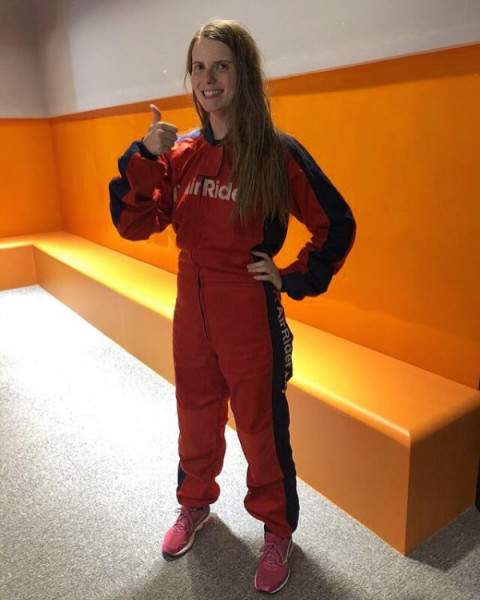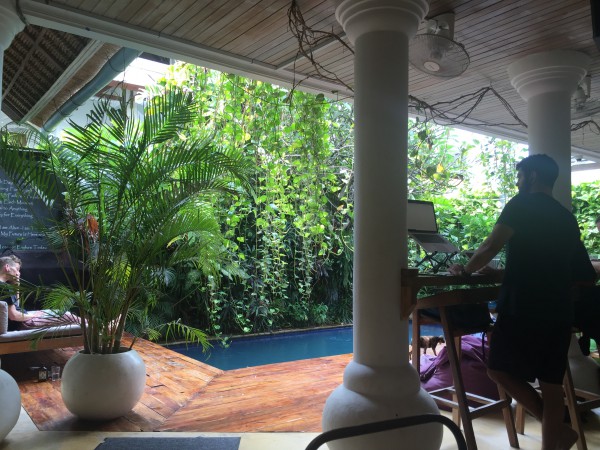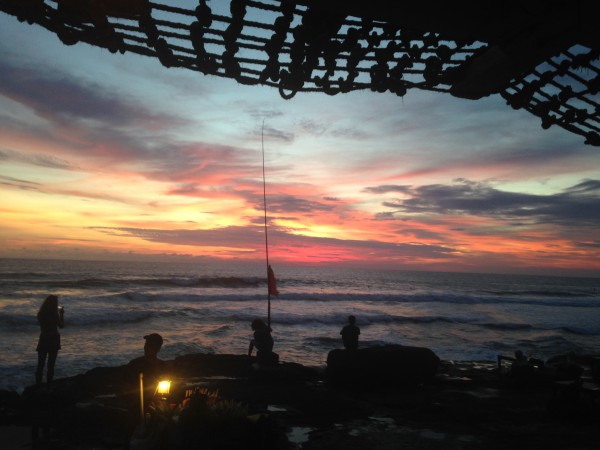
Interview with Hannah, a freelance writer that travels the world
How did you get started with remote work?
It wasn't easy at first. The process might be different depending on what type of remote work you're aiming for, but I can explain my process.
My friend John, knowing I enjoy writing, recommended I write on the platform Medium.
He gave me a challenge to write a piece every week. I took that challenge very seriously and didn't miss a week for an entire year. During this time, I worked standard in-person jobs.
I took that challenge very seriously and didn't miss a week for an entire year.
My writing was performing really well—it was getting significant views, comments, etc. When I moved, rather than find a full-time job, I got a part-time one. Now I had the time to make writing a supplemental income and, when I applied for jobs, I had plenty of samples to show.
No matter what your field, I highly recommend spec work whether it be redesigning a popular website to show design skills, coding your own app, or writing your own articles. But do it for yourself and keep all the rights.
Unless it's for a charity or close friend/family member, don't do anything for free. When you start to do work for others, show them creations you've created for yourself, and that proves your value.
My part-time writing grew until I decided to risk having it as my only gig. It was not easy going from there. However, I was in a point in my life where I was willing to take that risk. I recommend easing into 100% freelance unless you have a significant amount of money saved. It ended up working out for me, but not without some stress along the way.
It also helped when I really started to learn to charge closer to what I'm worth. Think about it: Would you rather work 10 hours for $10/hr or 4 hours for $25/hr? It's the same amount of money, but very different amounts of work. Don't charge barely minimum wage rates (or lower—I've seen it an endless amount of times) just because you are newer to a field. You can take that into account, but in the end, you're likely worth more than you think.
Read 114 answers from other remote workers
What are you working on?
555
Read 107 answers from other remote workers
What's your typical work routine?
Some people love routines, but I’m not one of them.
For many remote jobs you are expected to work standard days and hours. With a lot of remote jobs, the only difference is the location. That’s not what I enjoy or what I do.
I love to have my days varied and flexible. That means my day might start with social media work, writing, or something completely unrelated to work. This isn’t a good fit for everybody, but it works well for me. I’ve had to develop a lot of discipline for this because it can be easy to not accomplish much with this method.
I guess when I started freelancing part time and still had an in-person job, there was some flexibility built in from the beginning because there was less freelance work to do.
Something that helps me are time-tracking tools. They let me make sure I’m getting all the necessary hours in for my full-time job and allow me to see where the rest of my time is going. While I’m not a big scheduler, I am a fan of to-do lists and these help me remember everything I need to accomplish. I personally like bigger lists that have both work tasks and other life priorities.
At the beginning of this year, I worked as I traveled abroad in Southeast Asia. I’m now visiting my family in the United States for a bit and am deciding where to head next (thinking Singapore or Thailand).
Read 92 answers from other remote workers
How does your routine vary?
I like to start working as soon as I wake up to check a few things off my list, but wake up time varies because I don’t set an alarm.
Basically, when I’ve hit my hours for my full-time job or when I’ve completed the writing project I was working on, then I know I’m done.
This is where flexibility with the whole week comes in handy. I don’t necessarily work for eight hours a day for five days a week. I prefer to spread my work over six days so each day is a little less packed. Other people definitely like the opposite (more hours in less days), but this is what has been working for me lately.
Read 2 answers from other remote workers
Why does remote work require discipline?
If you want to work remotely, you need to develop the discipline for it. While you likely have chats with team members, there isn’t the same pressure as a boss physically staring at you in an office.
You need to be able to motivate yourself to do all your work or else it won’t get done.
If work isn’t getting done, you won’t have clients who enable you to work remotely much longer.
Something that helps me is really making sure to prioritize my most important tasks. Being busy and being productive are not always the same.
I look at my checklist for the day and ask, “What needs to get done today no matter what?” and “What big projects need to be chipped away at?”
Both are important questions and ignoring either can leave you in trouble. Once those questions are answered, it’s a lot easier to plan a general idea for my day.
Read 6 answers from other remote workers
How has your routine changed over time?
The entire point of working remotely is that I get a flexible schedule and can travel.

I didn’t learn that I wanted a flexible schedule from working remotely—I learned it from having several jobs that required me to physically be somewhere the exact hours my employer chose. If I didn’t mind doing that, I likely wouldn’t have sought out remote work.
I’m sure many others would disagree, but if I liked strict schedules remote work would have much less of an allure to me. I get bored and less creative with a strict routine. I guess when I started freelancing part time and still had an in-person job, there was some flexibility built in from the beginning because there was less freelance work to do. As I’ve scaled, keeping that flexible schedule has continued to be important for me.
Read 22 answers from other remote workers
Do you have a dedicated space to work?
My physical workspace changes depending on where I am. Last year, I had an office in my home with a desk. When I was abroad earlier this year, I worked at an amazing coworking space. Right now as I’m visiting friends and family, I mostly work at dining room tables. If there is a surface that fits my laptop, I’ll make it work.

Read 93 answers from other remote workers
How do you manage having too much or not enough work?
That has been a struggle in the past.
I transitioned into being 100% freelance. There was a time where I had a great part-time job that I physically went to three days a week and I freelanced the rest of the time. This was useful because, no matter how slow freelancing was, I still had consistent money coming in.
However, I still wanted even more flexibility so I could travel. Then, I transitioned to full-time freelance and it was definitely difficult at first because I could go from being extremely busy to having almost no work. During this I tried to cut personal expenses.
Right now, I have no problems getting enough work. One of my freelance jobs is full-time so, while I can take on side projects if I wish, there is always plenty of tasks to complete for my job and I know money is coming in.
It’s really important to focus on getting long-term clients instead of a bunch of one-time projects.
Unless you have some money saved up, I wouldn’t recommend going full-time freelance until you have some steady clients.
Read 18 answers from other remote workers
How do you stay on task?
As easy as it is to get off track, it can be difficult to get back on track. This is where it can be a good idea to make a nice list of priorities.
Feeling organized can do wonders to calm you down. The sooner you start to accomplish your tasks again, the better. Action is a lot better than overthinking. If you’re behind, you don’t want to dwell on that fact—it just wastes time. Accept it and move on.
The only way to get back on track is to jump back into work.
Read 100 answers from other remote workers
What do you like about remote work?
I love the flexibility, as long as I complete all my tasks, I can work from anywhere at any time.
Lately I’ve been waking up pretty early naturally, but I haven’t set an alarm in a long time. If I’m feeling sick one day, it’s great that I can sleep in and wear pajamas while I work. If I get stiff from too much sitting, I can decide to go take a walk.
Another advantage to remote work is that you can take advantage of how less crowded everything is on weekdays. If I can get enough work done on Sundays, it’s great to get lunch with a friend on a Monday because it’s a lot less busy than it would have been the day before when most people have off work.
I think it’s important to remember that working remotely doesn’t just change your life, but also the lives of people close to you.
This can be good or bad. If you plan to be traveling the world, either find a significant other who wants the same thing, or plan to be single while you do it.
Also with traveling, be prepared to miss the people you used to see more often and make sure to find time to email, Facetime, whatever it takes.
However, remote work also gives you the opportunity to visit friends who live far away more often, so it can also be useful for relationships. It’s important to maintain a good balance between work and personal relationships.
Read 106 answers from other remote workers
What do you not like about remote work?
For me, the hardest part of working from my computer is that it involves a lot of sitting. Too much sitting is terrible for your health. I’ve even heard people say that in some ways it’s as bad for your health as smoking.
Since right now I’m a complete digital nomad without a home base, it doesn’t make sense to invest in a standing desk. Some coworking spaces have standing options, but that’s not always the case, and I don’t always have a coworking space.
This means I need to get creative to keep healthy blood circulation flowing. There are a lot of tasks I need to sit for, but you can bet that if I don’t need to sit for a task, I’ll try to avoid it. If I’m on the phone, I’ll try to walk around. If I need to watch a video, I’m watching it while I’m doing squats or stretching.
Another tough aspect of remote work is that it can be isolating not working near other people. If there is a social coworking space nearby, I highly recommend signing up for it.
Coffee shops are a bit too noisy for me, but it’s another option. If a significant other or friend can also work remotely, try working in the same room. It may seem silly to have somebody nearby if you aren’t communicating frequently, but it’s still nice to have someone there for occasional chatting.

Read 103 answers from other remote workers
What tools do you use to stay productive?
My laptop is obviously essential for work, so I’m currently shopping around for a new one. I like to use time tracking apps like On the Job to track how I’m spending my time. This isn’t necessarily for clients—most of the time it’s for my personal reference.
Since some of my freelance work is writing, it can help me know what kind of rates to set. Writers often get paid per word instead of hourly, but depending on the topics, how much time it takes you to write the same amount of words can be very different.
So let’s say I just started writing on cryptocurrency and my time tracker shows that crypto topics take a lot of time to write. Now I know that for future crypto topics, I should charge more per word to make up for that.
I occasionally also use BreakTime, but not lately. You set how long you want to work and then how long you want your break to be. This is really good for two things:
- If you tend to get very focused when you work, it makes you stop and walk around a bit, which is important for your body.
- It can actually be motivating to work longer. If you want to take a break, but see that you only have ten minutes left before the app will tell you to, you’ll probably push yourself that extra ten minutes.
Read 108 answers from other remote workers
Where are your favorite countries to work remotely?
During my travels, I spent nearly two months in Bali, Indonesia. I learned about the coworking space The Dojo and quickly signed up. Great decision! It’s starting to gain a lot of attention and become busier, so I almost feel like I shouldn’t mention it in case I go back, but it was great. It’s a really social coworking space and the first one I ever worked at.
I’m spoiled now and no other coworking spaces may ever compare. I also went to Balipapan in Indonesia, Bangkok in Thailand, and Kuala Lumpur in Malaysia this year. I’ve had great experiences in all of these places and they’re definitely worth checking out.

Read 5 answers from other remote workers
What did we forget to ask Hannah Kowalczyk-Harper?
At RemoteHabits we're always trying to improve our interviews, what question should we have asked Hannah Kowalczyk-Harper?
Biography
Hannah Kowalczyk-Harper
Hannah is a freelance writer and social media manager that travels the world by working remotely. A social person, she loves to discuss writing, business, and travels.
Hannah is always open to learning about new, interesting opportunities. You can read some of her writing at https://medium.com/@MsHannahTweets and contact her directly at [email protected].
Work remotely? Share your story on RemoteHabits!
Want to be interviewed? If you have a remote position, head over to the interview me page!
Looking for a remote job?
RemoteHabits Jobs has everything you need to find your next great remote work position!
Related Interviews
Interview with Emma, a freelance marketing consultant
Emma is thriving as a freelance marketing consultant—see her tips on managing client demands & making yourself marketable as a freelancer.
Interview with Alyssa, a copywriter and content strategist
Alyssa has found her rhythm as a freelancer and founder of the blog, Freelancing Flow—see her tips for keeping it all running smoothly.
Interview with Deb, a sales copywriter who transitioned from software development
Deb made the jump from full-time software developer to freelance sales copywriter—learn how he made the transition.



